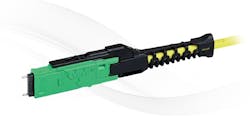On August 17 Cabling Installation & Maintenance will host a one-hour online seminar covering multifiber connectivity, with a specific focus on data center networks. The seminar is being sponsored by CommScope, Fluke Networks, and US Conec; those three companies are also providing expert speakers to educate attendees.
Here are descriptions of the seminar’s presentations.
VSFF Multi-Fiber Connectivity Addresses the Needs of Next Generation Data Centers (delivered by Jennifer Cline, director of business and technology development, US Conec)
For many years, the MPO/MTP connector has been the dominant array-style connector used in data center applications. Innovations in optical connector technology have produced new ferrule and connector solutions that solve the challenges facing data centers of the future as well as addressing the complexities associated with the MPO connector. This presentation will detail the new connector technologies and how they address the needs of next generation data center applications, with both backwards and forward compatibility. (US Conec's MMC connector is pictured on this page.)
Presentation: Designing a Dynamic Data Center Fiber-Optic Network (delivered by Ken Hall, solutions architect for global-scale data centers, CommScope)
Building on the previous discussion about multi-fiber connectivity options, this presentation examines the considerations for building a full end-to-end fiber-optic network inside a data center. Emphasizing important characteristics including ultra-low-loss performance and modularity, the presentation explains the critical considerations a data center designer must make when planning a network that is very likely to require changes over time, but that will always place high demands on its cabling infrastructure.
Presentation: Testing Tools and Techniques for Multi-Fiber Cabling Systems (delivered by Jim Davis, product application specialist, Fluke Networks)
Data center fiber-optic networks can contain a mix of singlemode and multimode fiber types, along with various connector interfaces. As is the case with any installed cabling, ensuring the fiber-optic system’s ability to support intended speeds and applications is essential. Achieving that peace of mind for a data center fiber-optic network requires the correct tools and testing approaches. This presentation covers the must-know information for fiber-optic technicians working in data centers, describing the setups they are likely to encounter, the test equipment available to provide performance assurance, and the best approaches to using that equipment.
After its live broadcast on August 17, the seminar will be available for on-demand viewing for six months. Individuals who attend the seminar in its entirety live or on-demand will be eligible to earn one continuing education credit toward the renewal of BICSI’s professional credentials including the RCDD, DCDC, OSP, and RTPM.
“The perpetual appetite for internet connectivity among business and consumer users continues to drive demand for the high-throughput capabilities that optical networking provides,” Cabling Installation & Maintenance said when announcing and promoting the seminar. “Data centers are the epicenters of the internet’s computing functions and data transmission, and as such, data centers are where fiber-optic networking technology evolution often manifest. This webcast seminar will focus on the technical developments in the realm of fiber-optic connections, with a particular focus on multi-fiber connectivity. It will examine multi-fiber connectivity from three angles: 1) new connector technologies and products that increase the number of fiber connections possible in a given space, 2) options for planning and implementing data center fiber-optic cabling systems based on the ability to connect multiple fibers in a tight space, 3) a ‘how-to, what-with’ look at testing installed fiber-optic cabling systems that incorporate multi-fiber connectors.”
You can find more information and register for the seminar on multi-fiber connectivity here.
About the Author
Patrick McLaughlin
Chief Editor
Patrick McLaughlin, chief editor of Cabling Installation & Maintenance, has covered the cabling industry for more than 20 years. He has authored hundreds of articles on technical and business topics related to the specification, design, installation, and management of information communications technology systems. McLaughlin has presented at live in-person and online events, and he has spearheaded cablinginstall.com's webcast seminar programs for 15 years.

